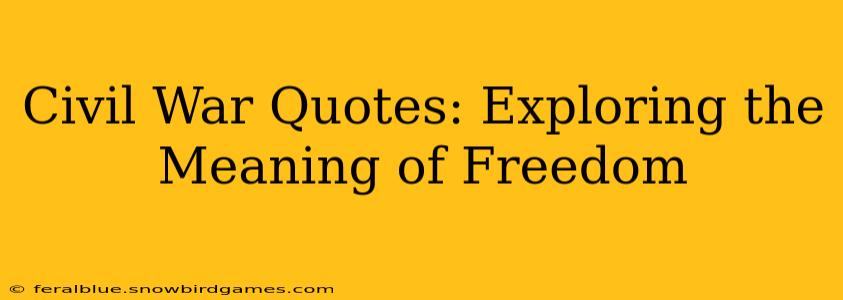The American Civil War, a brutal conflict fought from 1861 to 1865, was fundamentally a struggle over the meaning of freedom. While ostensibly about states' rights, the deeper issue was the institution of slavery and its irreconcilable conflict with the ideals of liberty and equality enshrined in the Declaration of Independence. Examining quotes from key figures on both sides reveals the vastly different interpretations of freedom held during this tumultuous period. These divergent perspectives illuminate the complexities and human cost of the war, offering valuable insights into the ongoing evolution of American ideals.
What were the major causes of the Civil War?
The Civil War wasn't caused by a single event but rather a confluence of factors that had been building for decades. The most prominent cause was undoubtedly slavery. The moral repugnance of slavery, coupled with its economic implications, created deep divisions between the North and the South. Differing interpretations of states' rights further exacerbated these tensions. Southern states fiercely defended their right to self-governance, including the right to maintain slavery, while the North increasingly viewed this as a threat to national unity and moral progress. Economic differences, particularly regarding tariffs and industrial development, also played a significant role. The election of Abraham Lincoln in 1860, a Republican opposed to the expansion of slavery, served as the final catalyst, prompting Southern states to secede from the Union.
What were the main differences between the North and the South?
The North and South differed significantly in their economies, social structures, and political ideologies. The North, largely industrialized, boasted a diverse population and a burgeoning urban landscape. Its economy was less reliant on enslaved labor, fostering a stronger sense of individual opportunity and social mobility. The South, on the other hand, was primarily agrarian, its economy heavily dependent on the cultivation of cash crops like cotton, tobacco, and rice, all produced through enslaved labor. This created a rigid social hierarchy where a small elite controlled vast landholdings and political power. This stark contrast in economic systems directly contributed to the different perspectives on freedom and the rights of individuals. The North championed a vision of freedom that included individual liberty and equality, while the South's interpretation of freedom was inextricably linked to the preservation of its social and economic order, which relied on slavery.
How did the Civil War impact the meaning of freedom?
The Civil War profoundly reshaped the meaning of freedom in America. The Union victory and the subsequent passage of the 13th, 14th, and 15th Amendments fundamentally altered the nation's trajectory. The abolition of slavery broadened the scope of freedom to include formerly enslaved people. The 14th Amendment granted citizenship and equal protection under the law to all persons born or naturalized in the United States, while the 15th Amendment prohibited the denial of suffrage based on race. However, the struggle for racial equality continued long after the war's conclusion, highlighting the ongoing tension between the ideals of freedom and the harsh realities of racial discrimination. The war forced a national reckoning with the hypocrisy of a nation founded on liberty while simultaneously tolerating the brutal institution of slavery. This led to a re-evaluation of the nation's founding principles and a renewed commitment to the pursuit of a more inclusive and equitable society, albeit one that would continue to grapple with the legacy of slavery for generations to come.
What famous quotes capture the essence of the Civil War?
Numerous quotes from the Civil War era encapsulate the conflicting ideals and sacrifices made during this tumultuous period. Abraham Lincoln's Gettysburg Address, though not explicitly a quote in the traditional sense, eloquently summarized the war's purpose: "that this nation, under God, shall have a new birth of freedom—and that government of the people, by the people, for the people, shall not perish from the earth." This resonated deeply with the North, emphasizing the preservation of the Union and the expansion of freedom to all.
Conversely, Southern leaders often justified slavery through their own interpretation of freedom. While fewer widely known quotes directly advocate for slavery, the very act of secession and the defense of states' rights, implicitly underscored the Southern view of freedom as tied to maintaining their social and economic system. Analyzing the context of these statements—be they speeches, letters, or battlefield pronouncements—is crucial to understanding the multifaceted nature of freedom during the Civil War.
How did the Civil War change the definition of American freedom?
The Civil War irrevocably altered the definition of American freedom. Before the war, freedom was often understood as limited to white male citizens, excluding women, enslaved people, and other marginalized groups. The war’s outcome fundamentally expanded the scope of freedom, even though the full realization of this expanded definition took many years. The abolition of slavery, though not immediately eliminating racial inequality, marked a significant step towards the ideal of a society where freedom was extended to all. The subsequent amendments further solidified this expanded definition, ensuring legal protection against discrimination based on race and establishing the principle of equal citizenship. The Civil War, though a tragic event, sparked a national conversation about freedom's true meaning that continues to shape American society today.
This exploration of Civil War quotes highlights the deep-seated divisions regarding the concept of freedom that fueled the conflict. The war’s legacy continues to resonate, reminding us of the ongoing struggle to fully realize the ideals of liberty and equality for all.

